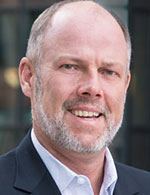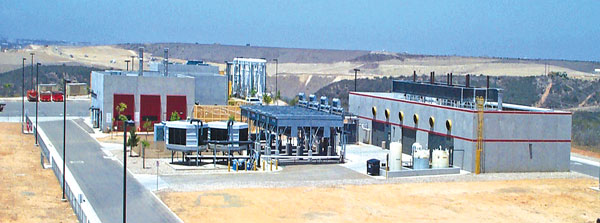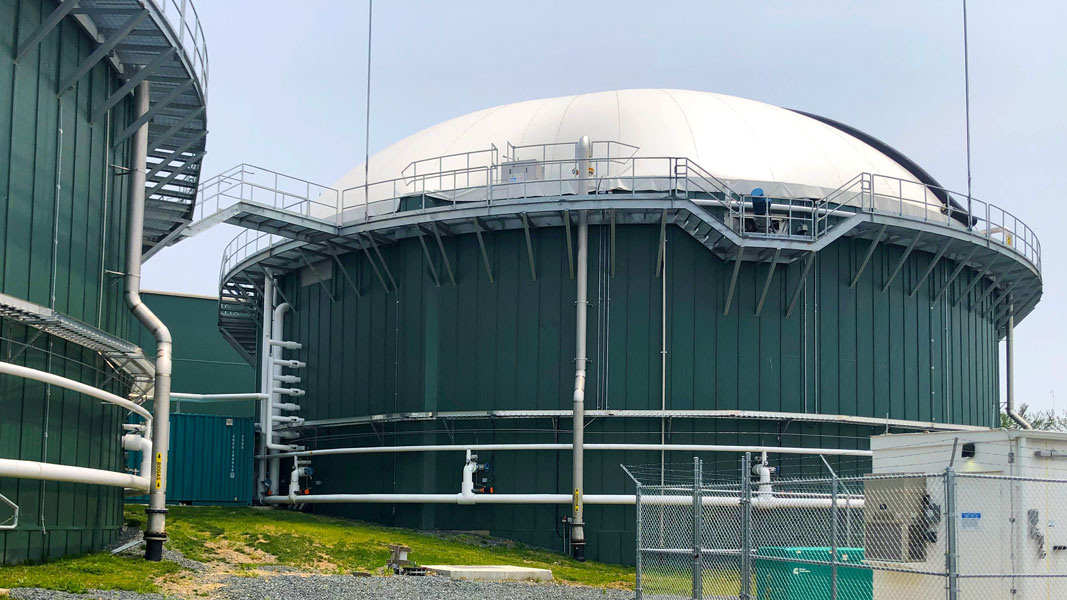Top: Bioenergy Devco’s merchant food waste digester in Jessup, Maryland. Photo by Paul Greene
 Paul Greene, Principal of GreeneTec, LLC, a biogas consultancy, attended the 2024 Biogas Americas conference in Savannah, Georgia the week of May 13. Greene, a BioCycle contributor, wrote up his takeaways from the American Biogas Council’s conference on his Linkedin page, which are captured in this BioCycle Brief:
Paul Greene, Principal of GreeneTec, LLC, a biogas consultancy, attended the 2024 Biogas Americas conference in Savannah, Georgia the week of May 13. Greene, a BioCycle contributor, wrote up his takeaways from the American Biogas Council’s conference on his Linkedin page, which are captured in this BioCycle Brief:

Miramar landfill gas to energy facility, San Diego, California. Image courtesy City of San Diego
- Landfill gas mojo: Greene was struck by how much the biogas industry has tilted in the direction of big mojo from landfill gas: “As a digester guy I am seeing merchant anaerobic digester (AD) projects having a hard time competing with landfilling.” The Renewable Fuels Standard (RFS) categorization of landfill biogas as a D3 cellulosic RIN for renewable natural gas (RNG) — which has a higher dollar value than D5 biogas from a digester processing food waste — was “fortuitous.” He adds that “the strength of the D3 RIN has landfill gas operators seeing banner success. Us humble builders of biodigesters have our work cut out for us just to get projects to pencil out.”
- Feedstock competition: The tug of war over feedstock for digesters vs. landfills “gives me pause and [makes me] think of the financiers that want to fund digesters,” he says. “Perhaps we as an industry need to think about standard feedstock agreements that we all can live with. A 10 year take-or-pay contract is pretty unrealistic in the current market realities of fighting with landfills for feedstocks.”
- Big oil impact: Greene observed at Biogas Americas that “big oil is making its mark in our industry, with Exxon Mobil, Chevron, BP, Suburban Propane and others in attendance. They are the ones responsible for buying and retiring the RINs. BP’s acquisition of Archea Energy [an RNG producer] gives it the luxury of not just buying and retiring RINs. Now it is vertically integrated and generating RINs, which boosts profits.”
- Landfill diversion policies: “Our industry needs to talk more about how an engineered biodigester is environmentally superior to landfilling when discussing landfill diversion policies for organic wastes,” he says. “Diversion mandates have worked in California and have stimulated AD infrastructure development in the New York City metro area.”
- Canadian RNG markets: Newer companies with new money that are building urban standalone merchant food waste digesters and securing an offtake contract to sell the RNG in the Canadian Clean Fuels market is a viable business for these plants, says Greene. “Thank you, Canadian utilities for your 10-year fixed price deals.”
- California’s LCFS: “A gray cloud hung over the conference with California’s (CA) Low Carbon Fuel Standard (LCFS) market hitting $42 this week [5/13/24],” notes Greene. “I look back on 2020-2023 as the best years for the CA transportation market. Lately the Canadians seem to have the best deals to offer for RNG. Who knows about the future. A better conversation was with a presenter from Boeing educating us on all the upside potential for making sustainable aviation fuel (SAF) to help airlines meet their carbon mitigation goals. Maybe the future is SAF?”
- EPC vs. Design, Bid, Build: “The pendulum has seemed to swing in the direction away from EPC (Engineering, Procurement, Construction) project development to more deals looking at breaking the projects into architect engineer, construction manager, general contractor-style projects that share risk,” states Greene. He explains that unlike an EPC, an owner would hire a project manager and an independent engineer to supervise these three entities to complete the engineering, procurement, and construction in a quest to gain more transparency on cost and avoid paying an EPC fee. “Dumping all the risk on the EPC may just be driving the cost of jobs up,” he adds. “Maybe as our industry matures, we’re getting better at building digesters.”













